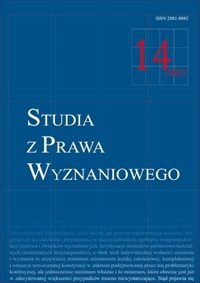Nadzór państwa nad punktami katechetycznymi na przykładzie działań administracji w Zielonej Górze wobec Kościoła gorzowskiego
State Supervision over Religious Instruction Centres - an Example of State Administration in Zielona Gora and Its Activities toward the Church Organ..
Author(s): Dariusz MazurkiewiczSubject(s): Law, Constitution, Jurisprudence
Published by: Katolicki Uniwersytet Lubelski Jana Pawła II - Wydział Prawa, Prawa Kanonicznego i Administracji
Keywords: law on religion; freedom of religion; the relations between the state, churches and other religious organizations; religious freedom; church - state relations (Poland); People's Republic of Poland, Catholic Church; anti-religious activities; Communist
Summary/Abstract: Immediately after World War 2, the communist authorities began to curb the Church's influence on the educational environment. Despite the commitment not to obstruct religious education in schools, undertaken in the Church-State Agreement of 1950, the authorities decided to reduce the number of religion classes and expel the instructors. In response, already in the school year 1952/1953, the Church initiated the establishment of religious instruction centres. A temporary change occurred during the political "thaw" in 1956, when religion was re-established as a school subject. This condition, however, lasted no longer than until 1961; according to the newly enacted law of 15 July 1961, religious instruction was ultimately removed from educational establishments, and the supervision over the entire educational activity was to be exercised by the Ministry of Education. The provisions of the new law provided for the management of religious instruction centres and instructed on their official registration. Consequently, the communist authorities were vested with special powers to visit and monitor the activities of such centres. In the parishes of the Gorzow Church located in the Zielona Gora region, the authorities responsible for handling denominational and educational affairs tried to make priests comply with the regulations, but the unyielding stance of the Gorzow Curia resulted in merely few priests registering their religious instruction classes and accepted remuneration for the teaching. Also, few priests consented to the authorities visiting religion classes held in the church premises and reporting on the instruction. Confronted with the ineffectiveness of both administrative action and unlawful pressure involving intimidation, blackmailing and punishing the priests conducting religion classes in the centres, in the mid-1970s, the authorities practically abandoned the control of such establishments, and in October 1981 repealed the unfair regulations recognizing that any religious instruction in parishes is an internal matter of churches and religious associations.
Journal: Studia z Prawa Wyznaniowego
- Issue Year: 2011
- Issue No: 14
- Page Range: 111-139
- Page Count: 29
- Language: Polish

